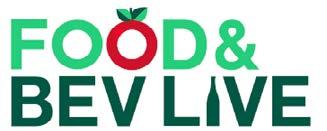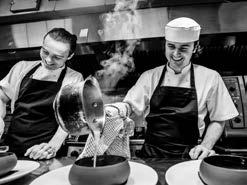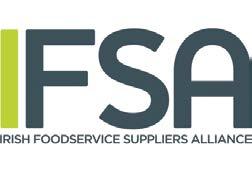
5 minute read
Food Prep Killing Future
It’s a growing feature of today’s hospitality industry that more and more hotels and restaurants are outsourcing their food preparation. This is a sign of a developing and increasingly sophisticated food industry but is it a wholly welcome development? With an increasingly sophisticated model, just how reliable has the provenance of food become? How can a larger supplier be a guarantee of supplying local produce? For Origin Green members, is this not something of a potentially retrograde step?
“It is a point that has been raised from time to time,” says Mark McGowan, President of the RAI. “I was asked down to Blas na hÉireann recently, where I was hosting a panel discussion about food fraud. I was asked that question – about what the RAI was doing about it.
“The truth is that there isn’t a whole lot that we can do as an organisation to police the situation. I think that responsibility lies with the restaurateur to ensure that they’re keeping track of their menu and that they’re keeping a handle on it. It’s the chef’s responsibility as well to make sure that they have their finger on the pulse if something does change.”
He gives the example of how things work in his own hotel and restaurant – Scholars Townhouse Hotel in Drogheda. Here, he says, they will always have their finger on the pulse in ascertaining the source of food from their suppliers on an ongoing basis.
“I think it’s up to the operators themselves to use due diligence and tact to ensure that their suppliers are delivering what they claim to deliver… It’s everybody’s responsibility. It’s not necessarily something that’s going to be policed.
20 H&RT FEBRUARY/MARCH 2020 “There was a case recently where someone was claiming to deliver Ballyhoura Mushrooms but they only deliver themselves and that supplier was named and shamed. That’s the kind of thing that can happen so you do have to be vigilant.”
As for the advent of suppliers doing more and more food preparation killing the tradition of ‘prep’ skills in our hotel kitchens, there is little evidence of it anecdotally. From McGowan’s perspective, it’s certainly not a problem he has faced, having, as he says, a smaller niche hotel and restaurant that might not be making use of pre-prepared suppliers as much as larger operations might be: “They (our staff) have a big workload but the last thing I want is for them to be standing idle or getting bored. We have a lot of students coming in on placement as well as our regular staff so I want to make sure that all of them are getting fully immersed in the business and dealing with food that requires preparation. It’s important that they’re learning skill sets that will carry them through their careers.”
As for the economics of buying more prepped food in, he sees the sense in it even if it doesn’t apply to his hotel and restaurant: “It would probably make more financial sense for us to buy some bits and pieces in but we just don’t because we’re managing well as we are – our occupancy is very high in the rooms and we’re in profit so we don’t want to lose track of where we’re going and what we’re about. I’d understand it if I had a 150-bedroom hotel where the economics would be a bit different.”
Maureen Gahan, Foodservice Manager with Bord Bia says that their regular surveys of the food industry on the island of Ireland supports the notion of a trend towards a greater dependency on suppliers of ready-prepared foods. It is, she explains, a development that stems from more general economic trends: “Generally what we’re seeing with the out-of-home market is that it mirrors the overall trends of the economy so if the country is doing well, then people have more money in their pockets and so they’re more likely to spend money on food and drink outside of the home. So as the economy has grown over the last number of years, so too has the out-of-home market.
That’s something we’ve been hearing from everyone in the catering industry over the last three or four years – that it’s getting harder and harder to find people.”
Buying food pre-prepared, Maureen says, is on the rise because it saves on labour costs and labour skills and because it also saves on time. That’s true of the whole range of pre-prepared food, whether it’s peeled and prepped vegetables or ready-made meal components.
“It isn’t the case that one solution is necessarily better than the other,” Maureen points out, as the approach is as varied as the company serving the food in their approach. “One has the tendency to automatically assume that it’s not as good as food that is cooked from scratch but that’s not the case.”
The food preparation business of catering for the caterers has undergone a lot of changes in recent years, with a good deal of larger companies getting larger and buying out the smaller ones. We’re now left with a smaller number of lesser-sized companies and two large main players in the field in Ireland – Swift in Castleblaney, Co Monaghan and Country Crest, who are based in North Co Dublin near Lusk.
One thing that ordered meal components or prepped vegetables can do for the likes of restaurants is that it gives them greater cost control and less waste. It is also conducive to the whole sustainability agenda: “A lot of times, it can make more sense for them to buy in components that are cooked and then frozen with the ability to be able to defrost portions as orders come in. That way, they’re not having to deal with so much waste. It can help restaurants or food outlets to plan better and manager their costs better.
“It’s also true that a lot of companies (in the food preparation business) have upped their game in terms of the quality of the food they’re supplying.”
As for the danger of our restaurants losing the skills of preparation if this trend continues, Maureen is not so certain of it but she does point out that while there are shortages of kitchen skills out there, the rise of the ready-prepped food sector is likely to continue.











